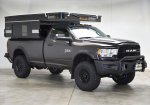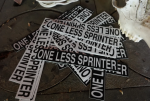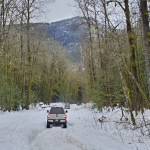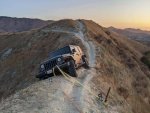We are discussing vehicle specifics but driver skill is probably the most important variable to consider.
Taking driver skill out of the equation you have short wheel-base vehicles like Jeeps which are quick to turn, light, and quite agile. Unfortunately, they ride terrible over long distances and have very limited carrying capacity when you measure weight and volume.
At the other end would be the larger 4x4 class A motorhome rigs. They ride like a dream on road and can carry everything and them some. But off road they are very difficult to maneuver, heavy, long, poor turning radius, and depending on the types of trails you desire to explore, sometimes impossible to even begin.
My recent selection was a compromise - it's not as short and nimble as a Jeep but it does slightly better compared to a crew car short bed. Carrying capacity is not an issue since she is a one-ton and I do have some additional room in the long bed. The top is compact and despite dragging the occasional small branch over the top vertical clearance has not been an issue.
And my off-road skills are a full step above average. I began wheeling three decades ago in stock vehicles with bald street tires, no lift, and no lockers. We learned how to hunt for traction while maintaining just enough momentum to carry you through or over an obstacle. I have wheeled in the mountains of Pennsylvania, the sandy bogs of Florida, the extreme temperatures and altitudes of the Rockies, and the so-much-traction-all-I-see-is sky of Moab.
I run most all trails in 2WD on AT tires - nothing fancy. If I do have problems I always have 4WD, then a locker, then a 16.5k winch. My suggestion is to put 20% of your effort into locating a vehicle that can meet 80% of your needs. Buy a cooler, add a winch, grab some paper maps and go have fun. You will be surprised at how little everything else matters after those basic needs are met.





